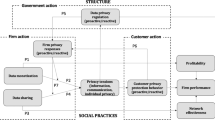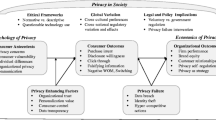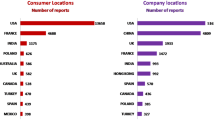Abstract
Commerce is a rapidly emerging application area of ubiquitous computing. In this paper, we discuss the market forces that make the deployment of ubiquitous commerce infrastructures a priority for grocery retailing. We then proceed to report on a study on consumer perceptions of MyGrocer, a recently developed ubiquitous commerce system. The emphasis of the discussion is on aspects of security, privacy protection and the development of trust; we report on the findings of this study. We adopt the enacted view of technology adoption to interpret some of our findings based on three principles for the development of trust. We expect that this interpretation can help to guide the development of appropriate strategies for the successful deployment of ubiquitous commerce systems.

Similar content being viewed by others
References
Ackerman M, Reagle J, Cranor L (2000) Beyond concern: understanding net users’ attitudes about online privacy. In: Vogelsang I, Compaine B (eds) The internet upheaval: raising questions, seeking answers in communications policy. MIT Press, Cambridge, Massachusetts, pp 47–70
Becker LC (1996) Trust as non-cognitive security about motives. Ethics 107(1):43–61
Cahill V, Gray E, Seigneur J-M, Jensen C, Chen Y, Shand B, Dimmock N, Twigg A, Bacon J, English C, Wagealla W, Terzis S, Nixon P, di Marzo Serugendo J, Bryce C, Carbone M, Krukow K, Nielsen M (2003) Using trust for secure collaboration in uncertain environments. IEEE Pervasive Comput 2(3):53–61
Duce H (2002) Message development. Auto-ID confidential briefing. Cambridge, Massachusetts
Fukuyama F (1996) Trust: human nature and the reconstitution of social order. Free Press, New York
Goffman E (1956) The presentation of self in everyday life. Doubleday, New York
Kourouthanassis P, Roussos G (2003) Developing consumer-friendly pervasive retail systems. IEEE Pervasive Comput 2(2):32–39
Martin AJ (1995) Infopartnering: the ultimate strategy for achieving efficient consumer response. Wiley, New York
Orlikowski W, Iacono CS (2001) The truth is not out there: an enacted view of the digital economy. In: Brynjolfsson E, Khim B (eds) Understanding the digital economy: data, tools and research. MIT Press, Cambridge, Massachusetts
Peters HP (2000) From information to attitudes? Thoughts on the relationship between knowledge about science and technology and attitudes towards technologies. In: Dierkes M, Von Grote C (eds) Between understanding and trust: the public, science and technology. Routledge, New York
Pew Internet and American Life Project (2000) Trust and privacy online: why Americans want to rewrite the rules. Pew Internet, 20 August 2000. available at http://www.pewinternet.org/reports_display.asp?r=19
Roussos G, Peterson D, Patel U (2003) Mobile identity management: an enacted view. Int J E-Commerce 8(1):81–100
Roussos G, Kourouthanasis P, Gryazin E, Pryzbliski M, Kalpogiannis G, Giaglis G (2003) Systems architecture for pervasive retail. In: Proceedings of the 18th annual ACM symposium on applied computing (SAC 2003), Melbourne, Florida, March 2003. pp 631–636
Salvador T, Bell G, Anderson K (1999) Design ethnography. Des Manag J 10(4):35–41
Sarma S, Brock DL, Ashton K (2000) The networked physical world: proposals for engineering the next generation of computing, commerce, and automatic-identification. Auto-ID white paper WH-001, MIT, Cambridge, Massachusetts
Solomon RC, Flores F (2003) Building trust. Oxford University Press, New York
Tugendhat E (1986) Self-consciousness and self-determination. MIT Press, Cambridge, Massachusetts
Acknowledgements
MyGrocer has been partially supported by the European Commission under research contract IST-1999-26238. The MyGrocer Consortium consists of the following members: Nokia Corporation, Procter and Gamble, Unisys Corporation, ATMEL Corporation, Pouliadis Associates Corporation, Athens University of Economics and Business, Helsinki University of Technology, S-Markt and Atlantic Supermarkets.
Author information
Authors and Affiliations
Corresponding author
Rights and permissions
About this article
Cite this article
Roussos, G., Moussouri, T. Consumer perceptions of privacy, security and trust in ubiquitous commerce. Pers Ubiquit Comput 8, 416–429 (2004). https://doi.org/10.1007/s00779-004-0307-6
Received:
Accepted:
Published:
Issue Date:
DOI: https://doi.org/10.1007/s00779-004-0307-6




